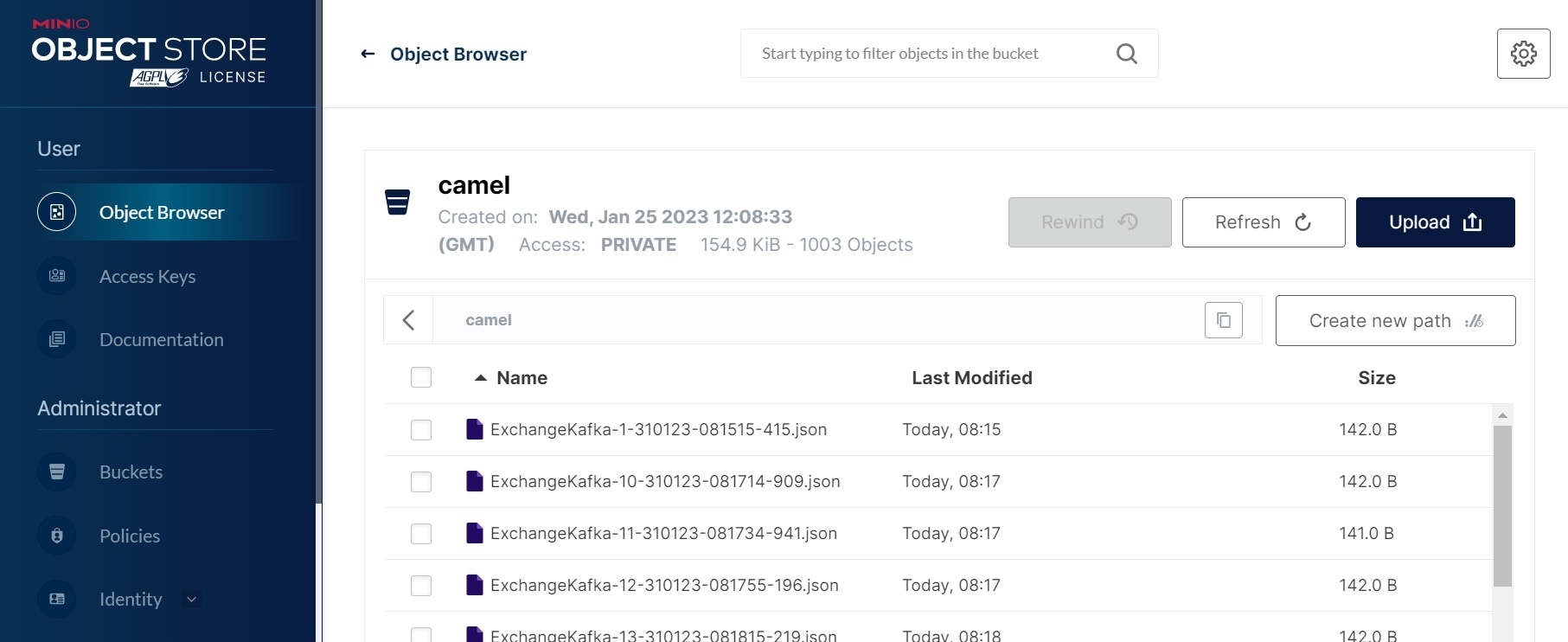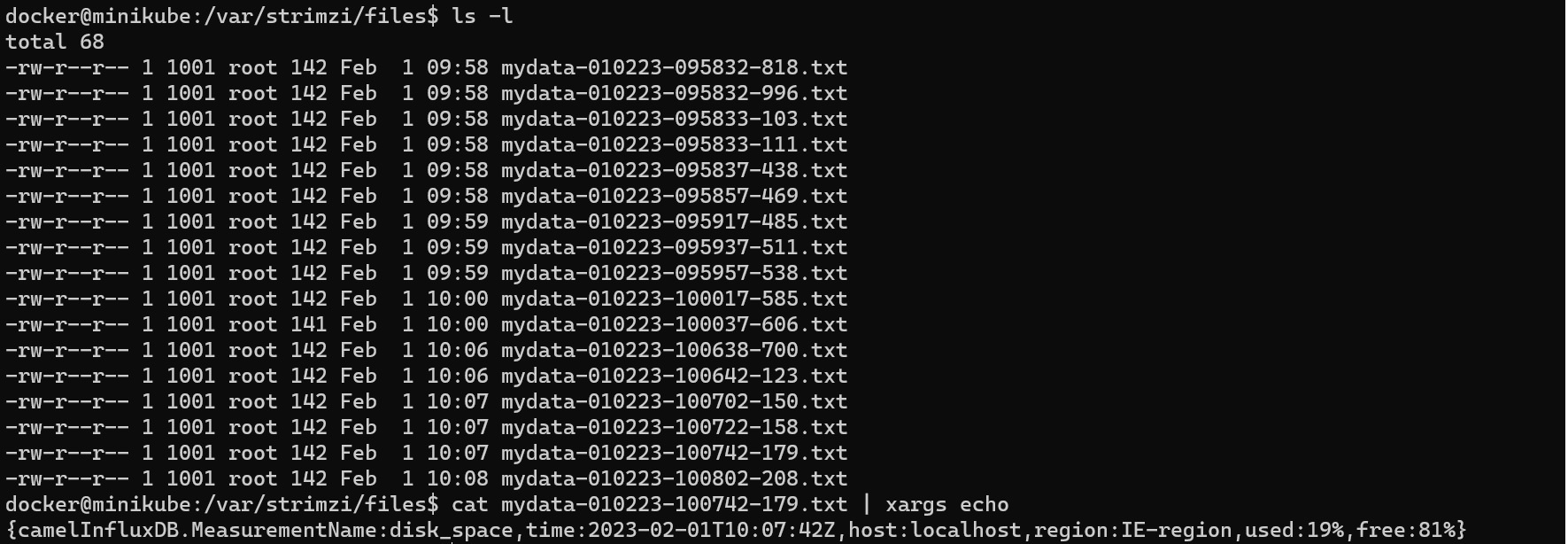...
The KafkaConnector is configured to use the "org.apache.camel.kafkaconnector.influxdb.CamelInfluxdbSinkConnector" class.
The value converter are is set to "org.apache.kafka.connect.json.JsonConverter".
...
The KafkaConnector is configured to use the "org.apache.camel.kafkaconnector.miniosink.CamelMiniosinkSinkConnector class.
The value converter are is set to "org.apache.kafka.connect.storage.StringConverter".
...
Here's a screen shot where we use the aggregator to set the file name:
File Sink Connector (Apache Camel)
Prepare the connector image
Download the file connector: wget https://repo.maven.apache.org/maven2/org/apache/camel/kafkaconnector/camel-file-kafka-connector/3.20.0/camel-file-kafka-connector-3.20.0-package.tar.gz
Create a docker file for this connector
| Code Block | ||||
|---|---|---|---|---|
| ||||
FROM quay.io/strimzi/kafka:0.32.0-kafka-3.3.1
USER root:root
RUN mkdir -p /opt/kafka/plugins/camel
COPY ./camel-file-kafka-connector-3.20.0-package.tar.gz /opt/kafka/plugins/camel/
RUN tar -xvzf /opt/kafka/plugins/camel/camel-file-kafka-connector-3.20.0-package.tar.gz --directory /opt/kafka/plugins/camel
RUN rm /opt/kafka/plugins/camel/camel-file-kafka-connector-3.20.0-package.tar.gz
RUN rm -rf /opt/kafka/plugins/camel/docs
USER 1001 |
Build the image and copy it to your docker repository
docker build -f Dockerfile . t ktimoney/strimzi_file_connector
Prepare the message producer
In this example we are going to deserialize the value to a string.
The value will take the following format:
| Code Block | ||||
|---|---|---|---|---|
| ||||
{
"camelInfluxDB.MeasurementName":"disk_space"
"time":"2023-01-23T13:03:31Z"
"host":"localhost"
"region":"IE-region"
"used":"19%"
"free":"81%"
} |
Due to some limitation with Strimzi KafkaConnect we will need to use a mutating webhook to attach a persistent volume to our connector pod.
The go code for this is available here: kafka-webhook.go
We need to create a docker image for this program
| Code Block | ||||
|---|---|---|---|---|
| ||||
FROM golang:latest
RUN mkdir /app
COPY ./kafka-webhook /app
RUN chmod +x /app/kafka-webhook
WORKDIR /app
ENTRYPOINT ["/app/kafka-webhook"] |
docker build -f Dockerfile . -t ktimoney/kafka-webhook
Mutating webhooks require https so we also need t create some certificates.
Make sure cfssl is installed on you system, then run the following commands.
cfssl gencert -initca ./ca-csr.json | cfssljson -bare ca
cfssl gencert \
-ca=ca.pem \
-ca-key=ca-key.pem \
-config=ca-config.json \
-hostname="kafka-webhook,kafka-webhook.kafka.svc.cluster.local,kafka-webhook.kafka.svc,localhost,127.0.0.1" \
-profile=default \
ca-csr.json | cfssljson -bare webhook-cert
Run the following commands to create the values you need to use in the yaml file:
TLS_CRT=$(cat webhook-cert.pem | base64 | tr -d '\n')
TLS_KEY=$(cat webhook-cert-key.pem | base64 | tr -d '\n')
CA_BUNDLE="$(openssl base64 -A <"ca.pem")"
Replace the values in : kafka-webhook.yaml
Note: You can also configure the hostPath and the containerPath as part of the deployment:
| Code Block | ||||
|---|---|---|---|---|
| ||||
containers:
- name: kafka-webhook
image: ktimoney/kafka-webhook
imagePullPolicy: IfNotPresent
command: ["/app/kafka-webhook"]
args: [
"-port", "8443",
"-tlsCertFile", "/certs/tls.crt",
"-tlsKeyFile", "/certs/tls.key",
"-hostPath", "/var/strimzi/files",
"-containerPath", "/opt/kafka/data"
] |
Run: kubectl create -f kafka webhook.yaml to start the pod.
Create the KafkaConnect object
| Code Block | ||||
|---|---|---|---|---|
| ||||
apiVersion: kafka.strimzi.io/v1beta1
kind: KafkaUser
metadata:
name: connect
namespace: kafka
labels:
strimzi.io/cluster: my-cluster
spec:
authentication:
type: tls
---
apiVersion: kafka.strimzi.io/v1beta2
kind: KafkaConnect
metadata:
name: my-connect-cluster
namespace: kafka
annotations:
# use-connector-resources configures this KafkaConnect
# to use KafkaConnector resources to avoid
# needing to call the Connect REST API directly
strimzi.io/use-connector-resources: "true"
spec:
image: ktimoney/strimzi-file-connect
replicas: 1
bootstrapServers: my-cluster-kafka-bootstrap:9093
tls:
trustedCertificates:
- secretName: my-cluster-cluster-ca-cert
certificate: ca.crt
- secretName: my-cluster-clients-ca-cert
certificate: ca.crt
authentication:
type: tls
certificateAndKey:
secretName: connect
certificate: user.crt
key: user.key
config:
group.id: connect-cluster
offset.storage.topic: connect-cluster-offsets
config.storage.topic: connect-cluster-configs
status.storage.topic: connect-cluster-status
config.storage.replication.factor: 1
offset.storage.replication.factor: 1
status.storage.replication.factor: 1 |
We are connecting to the 9093 tls port so we include required certificates in our configuration.
The image tag references the image we built earlier : ktimoney/strimzi-file-connect
Create the Sink connector
| Code Block | ||||
|---|---|---|---|---|
| ||||
apiVersion: kafka.strimzi.io/v1beta2
kind: KafkaConnector
metadata:
name: my-sink-connector
namespace: kafka
labels:
strimzi.io/cluster: my-connect-cluster
spec:
class: org.apache.camel.kafkaconnector.file.CamelFileSinkConnector
tasksMax: 1
config:
topics: my-topic
value.converter: org.apache.kafka.connect.storage.StringConverter
key.converter: org.apache.kafka.connect.json.JsonConverter
key.converter.schemas.enable: false
value.converter.schemas.enable: false
camel.sink.endpoint.fileName: mydata-${date:now:ddMMyy-hhmmss-SSS}.txt
camel.sink.path.directoryName: /opt/kafka/data
camel.sink.endpoint.fileExist: Append
camel.sink.endpoint.autoCreate: true
camel.aggregation.disable: true |
The KafkaConnector is configured to use the "org.apache.camel.kafkaconnector.file.CamelFileSinkConnector" class.
The value converter is set to "org.apache.kafka.connect.storage.StringConverter".
The connector filename is set using the expression: mydata-${date:now:ddMMyy-hhmmss-SSS}.txt
When the connector starts your kafka records will be copied to the persistent volume as files:
Links
...

